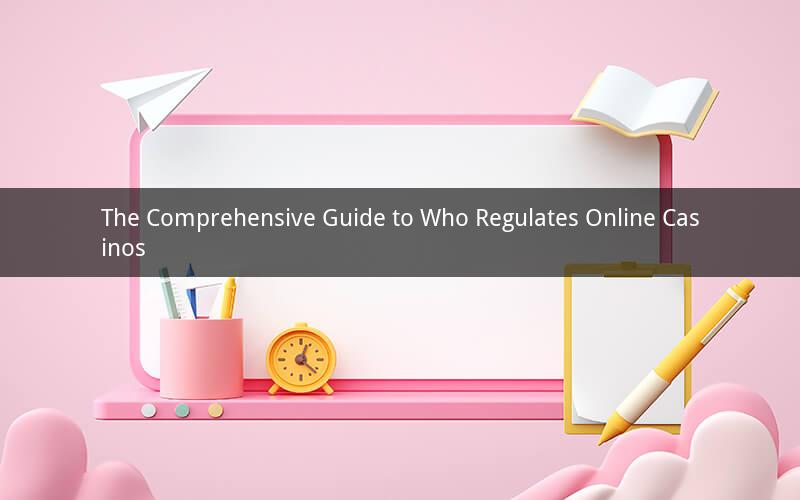
In the digital age, online casinos have become a popular form of entertainment and a lucrative industry. With the rise in popularity, the question of who regulates online casinos has become increasingly important. This guide will delve into the various regulatory bodies responsible for overseeing the online gambling industry, the criteria they use to ensure fair play, and the impact of their regulations on players and operators alike.
I. Introduction to Online Casino Regulation
Online casinos operate in a complex legal landscape, where different countries have their own regulations and laws. These regulations are designed to protect players, prevent fraud, and ensure that the industry operates ethically. The following regulatory bodies are responsible for overseeing the online casino industry:
1. United Kingdom Gambling Commission (UKGC)
2. Malta Gaming Authority (MGA)
3. Kahnawake Gaming Commission (KGC)
4. Gibraltar Regulatory Authority (GRA)
5. Curacao Gaming Authority (CGA)
II. United Kingdom Gambling Commission (UKGC)
Established in 2005, the UKGC is the independent regulator of the gambling industry in Great Britain. The UKGC is responsible for licensing and regulating gambling operators, ensuring that they comply with the Gambling Act 2005. The UKGC focuses on player protection, fair play, and preventing gambling-related harm.
Key aspects of the UKGC's regulation include:
1. Licensing: Operators must obtain a license from the UKGC to operate in the UK market.
2. Player Protection: The UKGC requires operators to implement measures to protect players, such as deposit limits and self-exclusion options.
3. Fair Play: Operators must use Random Number Generators (RNGs) to ensure fair play and transparency.
4. Financial Responsibility: Operators must maintain adequate financial resources to cover their liabilities.
III. Malta Gaming Authority (MGA)
The MGA is a regulatory authority responsible for the licensing and regulation of online gambling in Malta. The MGA has become a popular choice for online casino operators due to its favorable tax regime and robust regulatory framework.
Key aspects of the MGA's regulation include:
1. Licensing: Operators must obtain a license from the MGA to operate in the Maltese market.
2. Player Protection: The MGA requires operators to implement measures to protect players, such as responsible gambling tools and self-exclusion options.
3. Security: Operators must comply with strict data protection and cybersecurity requirements.
4. Financial Responsibility: Operators must demonstrate financial stability and adequate financial resources.
IV. Kahnawake Gaming Commission (KGC)
The KGC is an independent regulatory authority located in Kahnawake, Quebec, Canada. The KGC has been regulating the online gambling industry since 1996 and is known for its strict regulatory framework and high standards.
Key aspects of the KGC's regulation include:
1. Licensing: Operators must obtain a license from the KGC to operate in the Canadian market.
2. Player Protection: The KGC requires operators to implement measures to protect players, such as responsible gambling tools and self-exclusion options.
3. Fair Play: Operators must use RNGs to ensure fair play and transparency.
4. Financial Responsibility: Operators must demonstrate financial stability and adequate financial resources.
V. Gibraltar Regulatory Authority (GRA)
The GRA is the regulatory authority responsible for the licensing and regulation of online gambling in Gibraltar. The GRA is recognized as one of the most reputable regulatory authorities in the industry due to its strict regulations and high standards.
Key aspects of the GRA's regulation include:
1. Licensing: Operators must obtain a license from the GRA to operate in the Gibraltar market.
2. Player Protection: The GRA requires operators to implement measures to protect players, such as responsible gambling tools and self-exclusion options.
3. Fair Play: Operators must use RNGs to ensure fair play and transparency.
4. Financial Responsibility: Operators must maintain adequate financial resources to cover their liabilities.
VI. Curacao Gaming Authority (CGA)
The CGA is a regulatory authority located in Curacao, which is known for its favorable tax regime and flexible regulatory framework. While the CGA is not as stringent as some other regulatory bodies, it still requires operators to adhere to certain standards.
Key aspects of the CGA's regulation include:
1. Licensing: Operators must obtain a license from the CGA to operate in the Curacao market.
2. Player Protection: The CGA requires operators to implement measures to protect players, such as responsible gambling tools and self-exclusion options.
3. Fair Play: Operators must use RNGs to ensure fair play and transparency.
4. Financial Responsibility: Operators must demonstrate financial stability and adequate financial resources.
VII. Conclusion
The regulation of online casinos is crucial for ensuring a safe and fair gambling environment. By adhering to the regulations set forth by these regulatory bodies, operators can provide players with a secure and enjoyable experience. As the online gambling industry continues to grow, it is essential for players to be aware of the regulatory bodies responsible for overseeing the industry and the measures they take to protect players.
Questions and Answers:
1. Q: What is the primary role of the United Kingdom Gambling Commission (UKGC)?
A: The UKGC is responsible for licensing and regulating gambling operators in Great Britain, ensuring player protection, fair play, and preventing gambling-related harm.
2. Q: Why do online casino operators choose to obtain a license from the Malta Gaming Authority (MGA)?
A: Operators choose the MGA due to its favorable tax regime, robust regulatory framework, and recognition as a reputable regulatory authority.
3. Q: What measures does the Kahnawake Gaming Commission (KGC) take to ensure fair play in online casinos?
A: The KGC requires operators to use Random Number Generators (RNGs) to ensure fair play and transparency in their games.
4. Q: How does the Gibraltar Regulatory Authority (GRA) contribute to the safety of online gambling?
A: The GRA requires operators to adhere to strict regulations, including player protection measures, financial responsibility, and fair play, to ensure a safe and secure gambling environment.
5. Q: Why is the Curacao Gaming Authority (CGA) considered a flexible regulatory authority?
A: The CGA is known for its flexible regulatory framework, which allows operators to operate with fewer restrictions compared to some other regulatory bodies.